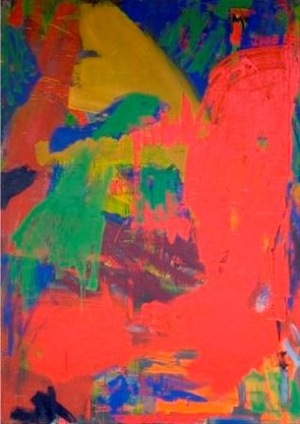IN MEMORIAM OF A.VAITKŪNAS. SIGNS. 0
A.Barzdukaitė-Vaitkūnienė
www.kamane.lt , 2007 10 01
A.Vaitkūnas. “Towards the Rivulet”. 2000, canvas, oil. 198 x140 cm
“It is most probably a sign”, Arūnas loved repeating. Once when we were driving from our homestead to Kaunas, a black cat ran over a village road. Arūnas turned the car round and we drove along another road. It is a funny episode but it was significant for him.
There were many such signs, he saw meaning between the lines, not only in sentences when he communicated with people. Glances and movements were significant. The world opened up like a text to Arūnas providing the needed information. Being in the city or in nature, travelling round Lithuanian places, he knew how to read manifestations of nature, certain codes.
I remember that we drove round Skuodas district, in 1994 most probably. When you descend the right slope at Apuolė mound, there is an impressive stone the top part of which is graven with runes. They are visible only when the sun is shining. Arūnas was going to draw them in his notebook. When he started drawing, the clouds covered the sky. He waited till the sun appeared but the clouds persisted as soon as he took the pencil. He tried three times but some powers did not let him redraw the runes. It left a big impression on him. He took it as a sign of contact with the ancient world of pagans.
He loved wandering on feet like a lonely traveller. I remember one of his stories about a trip in Dzūkija, along the banks of the Ūla river extremely brightly – the story is from year 1986. I believe that later he embodied the story in his canvas “Towards the Rivulet”.
Arūnas said that Buddhist mood prevailed in Dzūkija. It seemed to him that nothing was necessary for a human being but to be there. The colours were so fade – grey, yellowish green, like in weavings of southern Lithuanian women.
Travelling along the banks of the Ūla, he observed the views like an artist as well as signs by which the world spoke to him, the lonely traveller.
Arūnas told: “The blue summer sky reflected in the waters of the Ūla turning into ultramarine blue spreading coolness and cold. The summer day was extremely hot. Silver bunches of grey wormwoods stuck out in the dried meadows spreading a bitter smell. It was empty around – the sky and the swinging pines. Junipers seemed black in the background of yellow meadows. Where the Ūla made a bend, in the glade, a dress of a woman flickered in raspberry red and disappeared in the thicket of the pine forest suddenly. The hardly visible path lead on but a large hissing grass-snake raising the crowned head stopped the way.”
It was a full stop, a sign to Arūnas that the trip had to be ended. Nature used to speak to him offering themes and plots. Arūnas often joked while travelling: “If you turn right, you’ll lose your head, if you turn left, you will not return alive”.
Deep essence of human existence was hiding in these words. Whatever we choose, the end of the travel is always the same.









